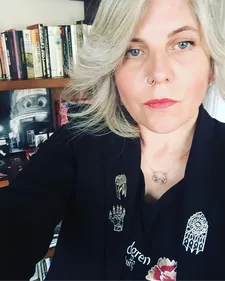 |
| Kier-La Janisse |
First released in 2012, Kier-La Janisse’s House Of Psychotic Women was of major importance in the appraisal of horror cinema, and remains one of the most influential work looking at the genre from a female perspective. Part memoir, part critical exploration of key genre titles, it is remarkable in its scope and in its contextualisation of key works. Tomorrow the expanded tenth anniversary edition will be launched at the Fantasia International Film Festival in Montreal. Ahead of the festival, Kier-La and I met up to discuss the book, and I asked her where she began in taking on the enormous task of bringing it up to date.
“I made a point of not really looking at what I wrote before, because I always hate my writing when I look back at it even a year later,” she says – something which a lot of authors will relate to. “I knew that if I went through it, I would just want to change everything. In some cases I knew nothing about the filmmaker when I wrote something and now I know way more about them, and I can correct things and stuff. And so I just decided to not go there at all, and just focus on adding more films to the appendix to make it more complete.
“It was never going to be comprehensive, because there's actually too many movies – it wasn't feasible for me to write about every movie that I could think of that might fit. But I was aiming to get 100 more movies in there. I left the rest of the writing untouched, knowing that there's probably a lot of cringeworthy stuff in there. I also didn't want to do a revised edition because the book is so personal, and it was so personal where I was at that point in my life that I just felt it was really important to leave it as a thing of its time and leave it to where my headspace was in 2012, when I wrote it, because I was dealing with a relationship ending and my mom dying. There were very tangible things happening in my life that affected how I wrote.
“There's definitely things where, for instance, I didn't think I had written about Misery, the Stephen King adaptation, and so I was going to write a review of that for the new edition, and then I went through the book and realised it actually was in there already. I read what I wrote about it and I was like, ‘Oh my God, this is so obnoxious.’ It’s something that I would never write now. And I'm just like, well, that stuff is in there.
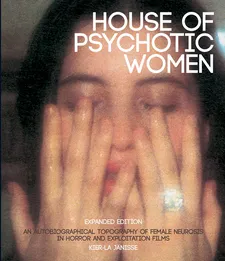 |
| The 2022 edition of House Of Psychotic Women |
“The only thing I do wish was that I had thought to demarcate the films in the appendix that were newly added, because I think that might be interesting for people to be able to see how my thoughts about movies were different, maybe, 10 years ago. But I really wanted it to just be a service to the filmmakers, because of this stuff that was added, a lot of that is newer films that were made in the last 10 years. And so it was kind of a way for me to give back to those filmmakers. In some cases, people who had told me they had been inspired by the book when they made their movie, or that they had read it while they were making a movie. I wanted to honour all the people who had started to make work in that area over the last 10 years.”
Even when the book first came out, there were people making a fuss about the fact that some big name films weren’t included. Was she simply more interested in letting people know about other work that wasn't so well known?
“It's definitely a priority for me,” she says. “I mean, as a writer, it's so boring to me to write about films have been written about a lot. If I have this much time to write, I have to choose where I want to put my time. And if there's all this other writing on that film, then my time is better served showcasing a film that isn't as well known.”
Did she find that new themes developed as she added films?
“I feel as though they did,” she says. “And I do remember feeling as though I had to try to pick different movies to write about, because there were too many that had the same approach. But you know what, there tends to be probably five or six different types of themes that these movies use. There's the sisters, you know, like, one sibling is crazy and the other one is always picking up after them. There's the relationship with the overbearing mother. There's women who have issues with motherhood themselves, like they have internal conflict about motherhood. There's just certain types of these films, and it's really about what the individual directors and writers do with them that makes them unique.
“I love movies about toxic friendships because I have had friendships that have gotten very competitive and stuff before, so I like movies that delve into that. And there were three close together, a movie I love called Always Shine and Queen Of Earth came out around the same time, and they were both very similar, and I think they had had connections with each other, you know, like, the people knew each other making the movies and stuff. There was so much more production around 2012. And now, there are more films that could fit House Of Psychotic Women than there were in the history of film up to that time.
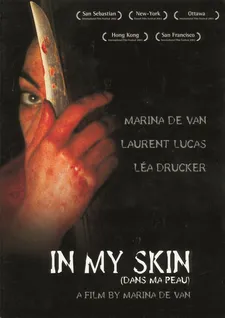 |
| In My Skin poster |
“When I sat down and started making a list of films to write about it was kind of crazy, because there were so many people making films about female interiority and stuff during that time, like female relationships, female friendships, and I don't know whether that's because of initiatives to have more women storytelling, or what the causes for this were, but there definitely were so many of these films, and especially ones that cross genre boundaries, where the filmmakers were not necessarily horror filmmakers.
“There were so many more of these films, and also, they are interesting things to do when you don't have a lot of money. When you're a real budget director, you know, you can have a woman alone in a house, and you can make the whole movie. Like I Am The Pretty Thing That Lives In The House, which I mentioned in the context of The Blackcoat’s Daughter. There's so many of these movies where you're really just with one woman and whatever she is feeling, and I love movies like that.”
The decade since the book was first published has been a tumultuous one in terms of public thinking about gender and relationships between men and women. Does she think that has affected the way in which films are made?
“In the new edition of the book, I write about the movie Gaslight, because I had forgotten to write about it the first time around and it's so important to this genre. And that term, gaslighting, became a thing over the last ten years. It was coined years ago, it's older than that, but it really started to be used by everybody. Everybody knows what that term means now, and it is completely overused. But I feel like a lot of film is dealing with micro aggressions against women. There's definitely more awareness of the hostile environments that women live in, now. The hostile environment they live in just every day, by walking down the street, or being in a work meeting, or whatever. I definitely feel like there's a lot more of these films that are dealing with that, and definitely way more women directors. I would say, there's way more women directors represented in the expanded reviews than there were in the original reviews. And so there's a lot more women who are speaking from their own experiences making those films.
“I do think that on the part of many men, there's clearly a hyper-awareness of these kinds of gender issues, but then there's also more women making the films. And you know, it's interesting to to see what women do with it, because you have somebody like Gillian Horvat, who made I Blame Society. I don't know if you've seen that movie but it's very funny, and it’s basically a story of what her life is like and just like all the dumb things that people say to her in Hollywood meetings. The horror aspect of the story is the fictional part, but you can tell that everything around it, all the characters, you can tell these are all just people playing mostly themselves, you know? So yeah, it's interesting, because I feel like there's definitely more of an ownership on both sides, like both men and women, of what these stories are about.”
 |
| I Like Bats poster |
Something which comes out early in the book, in the original text, is a question: are all women crazy? And the thing that always struck me as a subsidiary question, I tell her, is this: is crazy the rational thing to be in that situation? In a society which treats women the way it does. Is that something which she was interested in exploring the first time around?
“Absolutely,” she says. “I mean, that is the point of why I said that. It's a very inflammatory thing to say. But as you start going through each movie, and not just in the appendix, but just in the main part of the book, it's basically showing that...” She sighs. “The problem with writing a book like this is, I'm having a hard time seeing how the women are crazy. They just seem like they are reacting the way a normal person would react when someone is doing this to them. They are being driven to the edge, in many cases by external hostile factors.
“So, yes, there's a lot of women I know who I would say are highly neurotic or hyper-vigilant or very defensive, all of these things. But as you look through each of the movies, and as I tell my personal story related to the films, it's clear that all of these kinds of reactions are just built up in you because of societal factors. Most of these people are actually pretty high functioning considering how much shit they're dealing with in life, and especially in the cases of horror films, where they're dealing with much more extreme situations. So I mean, it's like I could say ‘Yes, all women exhibit this kind of behaviour.’ That I know, you know.” She laughs. “I think also part of that is the type of women I end up being around or making friends with. There's probably a whole bunch of other women in the world who are happy and whatever, but I don't know any of those. So I make a point in the book of constantly reiterating that I'm speaking from my own experience. This is not an academic book where I've done empirical research or surveyed women, it's really based on my perceptions.”
That brings us back to something else in the book, where she writes about horror films as a place to find truth or something which felt more true to her when she was watching them. We can talk about extreme situations in horror, but does she think that the genre offers a way of condensing something from the real world so it can be talked about, when it's ignored in a lot of other films?
“Yeah, absolutely,” she agrees. “I mean, I think that's one of the things horror has always been lauded for, that it is able to dive into these issues more directly, and often earlier, than more mainstream films. It's partially because for things like horror and melodrama, the fantasy element makes it okay to go into these very dark psychic spaces. And horror is not afraid of things being messy. I mean, horror and porn are the messiest genres, probably. Horror is not afraid of physical messiness. It's not afraid of emotional messiness. And I think that's one of the reasons people love horror.
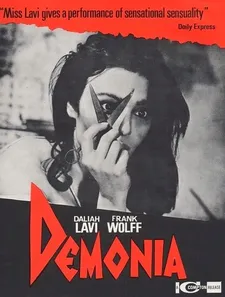 |
| Demonio poster |
“There were genre film festivals in the Sixties and Seventies, but I would say there was a prolific explosion of genre film festivals in the early 2000s. And from that time on, where you started to have more places for genre fans to meet each other and talk, and then having blogs become a thing where people could talk freely about what they thought about films and stuff like that, all these genre films have popped up. There’s a good fan base now with people that are either hardcore horror fans, or it's their preferred genre that they tend to gravitate towards. There are so many more of these people that we know about now. And that's not to say those people weren't there before. But there's ways for this fan base to be visible in ways that it never was before.
“What I've heard from so many of these people is very similar to my story. The ways that they relate to these films and the function these films have in their lives and how these very extreme, exaggerated circumstances help them navigate the smaller situations of their daily lives. In some cases, they're not small situations. In some cases, people are dealing with horrible abuse, but so many people now write about how their mental health issues have been tempered by regularly engaging with horror narratives, and that was certainly my experience.
“There's a documentary coming out called Mental Health And Horror that is, I'm assuming, dealing with that exact thing. It's a sentiment that I hear everywhere, all over the horror genre, that this is a function that these films serve for these people that critics of horror films – it would never cross their minds. These movies are actually therapeutic. People who don't like horror films see it as some kind of sadistic impulse to watch horror, and I think they're always very surprised that for many people there's a calming effect.”
We talk about her teenage years and how she was obsessed with Molly Ringwald, and how this prompted her to visit a jazz show of Molly’s and give her a copy of the book when it was first published. Molly asked her to sign it, and she did, but she didn’t expect the actress to actually look at it. Then, years later, Molly posted a picture of the book on her Instagram, and when Kier-La reached out to her about it she responded straight away.
“She said that her daughter was a horror fan and that was why she read it. She herself never understood the appeal of horror, and she didn't know whether she should be like worried that her daughter was into these movies and stuff like that. And she said that my book helped her to understand it, that people relate to these movies in a way that she hadn't thought of, and that was why she gave me an endorsement. It really was about her relationship with her daughter. And that was kind of amazing.”
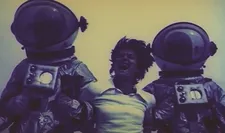 |
| Footprints |
The other thing that strikes me about critics of horror as a genre, I note, is that they tend to think of it as something that's entirely aimed at men, and at festivals that's not what we see at all.
“It is one of the first things people always say to me, when I say I focus on horror in my writing,” she nods. They say ‘Even though you're a woman?’ and I'm just like, you know, half the people who are into horror are women. The person who invented horror, pretty much, was a woman, Frankenstein is one of the most classic horror stories of all time. But that myth still persists among non horror people. I mean, as a teenager, I didn't know any other women that liked it, but I didn't have conventions or festivals to go to, there was no internet. I had no way to find other horror fans. So I had no clue.
“I remember meeting my first female horror fan and and just being like, ‘Wow!’ you know? I used to run a little film festival [Cinemuerte] in Vancouver, and seeing women come with each other and not with a boyfriend or something made me so happy. There were tons of women who would come to my festival. And so when I would have my festival merch, all the guys would complain, because there'd be like, one thing for men and then lots of things for women.
“People are always like, ‘Where did all these female horror fans come from?’ They were always there, it's just that they didn't know that other people were out there. It took like the internet and it took various things... even when you did find out about a convention or something, it's very intimidating to go as a woman by yourself in that environment. I think it took a while for women to feel comfortable going into those spaces, so I think for the first decade or so of horror conventions, yes, it probably was mostly men, it takes a while for women to meet other women and feel comfortable, and then that gradually makes it easier.”
Now there is a whole new generation of people who have become interested in the genre since the book came out. I ask her how she feels about connecting with them, and she admits that it makes her nervous.
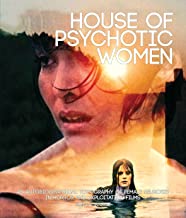 |
| House Of Psychotic Women original edition |
“I know that even though the book was a progenitor of a certain type of writing about film, there's a lot of people who've come out in the last ten years who are way beyond where I was. There's so much more genre writing, there are people who have way more insightful things to say about some of these films than I say in the book. So yeah, I don't know whether its new audiences will appreciate it or not. But there were so many more films in the last ten years, that's why I did it. And that it would mean something to those people for their movies to be in the book.”
Fantasia is the ideal place for her to launch it.
“It’s kind of like my home festival. I think the first festival I went to was the Vancouver International Festival, but Fantasia was definitely the first genre film festival I'd ever been to. It was also the first festival that treated me as a film professional. I had a xeroxed fanzine, I would make like 100 copies of that. It was not widely distributed. And I had this little festival that I had put on one year and half the movies I played illegally, because I didn't even know what I was doing. And I went to Fantasia that year. And Mitch Davis, who was the international programmer at the time – now he's the co-director – he just embraced me and he treated me the exact same as he treated John Carpenter. In those early days of Fantasia, it was shocking to me how you'd be sitting at a table at the bar with all these people who are like a million times more famous than you, and yet you're treated exactly the same, you know? And obviously, the festival has grown a lot since then, so everybody's not all able to fit at the same table anymore, but they've managed to retain that vibe more successfully than almost any other festival I've ever been to, over their whole history.
“A lot of that is down to Mitch Davis, who is just a force. He's such a unique, caring, compassionate person, you know? And he just feels for every single filmmaker that's at that festival, and genuinely loves that films and yeah, I love Fantasia.”
Last year she enjoyed considerable success with her film Woodlands Dark And Days Bewitched: A History Of Folk Horror. She now has a new film project on the go, but it’s at a very early stage.
“My boss has approved it, and I've started to think about some of the research materials and things that I need to read to prepare, but it hasn't really gone further than that. This book tour is hopefully going to take me through November, and then I have another book about the movie Cockfighter that's very, very late. So I really need to be able to have some downtime to work on that before another film.”





















